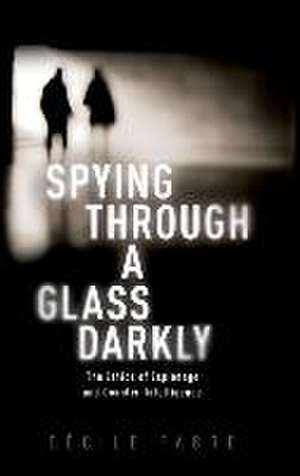Spying Through a Glass Darkly: The Ethics of Espionage and Counter-Intelligence
Autor Cécile Fabreen Limba Engleză Paperback – 15 ian 2024
| Toate formatele și edițiile | Preț | Express |
|---|---|---|
| Paperback (1) | 129.00 lei 10-16 zile | |
| OUP OXFORD – 15 ian 2024 | 129.00 lei 10-16 zile | |
| Hardback (1) | 246.14 lei 10-16 zile | +51.70 lei 4-10 zile |
| OUP OXFORD – 25 ian 2022 | 246.14 lei 10-16 zile | +51.70 lei 4-10 zile |
Preț: 129.00 lei
Preț vechi: 156.39 lei
-18% Nou
Puncte Express: 194
Preț estimativ în valută:
24.69€ • 26.83$ • 20.75£
24.69€ • 26.83$ • 20.75£
Carte disponibilă
Livrare economică 20-26 martie
Preluare comenzi: 021 569.72.76
Specificații
ISBN-13: 9780198912170
ISBN-10: 019891217X
Pagini: 272
Dimensiuni: 155 x 235 x 150 mm
Greutate: 0.41 kg
Editura: OUP OXFORD
Colecția OUP Oxford
Locul publicării:Oxford, United Kingdom
ISBN-10: 019891217X
Pagini: 272
Dimensiuni: 155 x 235 x 150 mm
Greutate: 0.41 kg
Editura: OUP OXFORD
Colecția OUP Oxford
Locul publicării:Oxford, United Kingdom
Recenzii
Superb . . . an immensely important contribution to the intelligence literature
Though this is a work of academic philosophy, it is nonetheless of considerable interest to those actively working in the UK intelligence community, many of whom (contrary to popular imagination, perhaps) take very seriously the ethical dimensions of their work.
Cécile Fabre's latest book further demonstrates that she is among the most insightful and prolific thinkers working on the ethics of foreign policy. Here she expands her reach by turning to an underaddressed issue in political theory and applied ethics: the morality of espionage.
An excellent work of applied moral philosophy. It is philosophically rigorous, but clearly written. . . . The breadth of her research is remarkable.
A comprehensive and forensic survey of espionage practices and the necessary evils sometimes carried out by their exponents. It would be of particular interest to philosophers, legal theorists and military historians.
A definitive treatment of this subject matter.
The book is a magnificent achievement and deserves to be a classic in the fields of law, philosophy and international relations.
Though this is a work of academic philosophy, it is nonetheless of considerable interest to those actively working in the UK intelligence community, many of whom (contrary to popular imagination, perhaps) take very seriously the ethical dimensions of their work.
Cécile Fabre's latest book further demonstrates that she is among the most insightful and prolific thinkers working on the ethics of foreign policy. Here she expands her reach by turning to an underaddressed issue in political theory and applied ethics: the morality of espionage.
An excellent work of applied moral philosophy. It is philosophically rigorous, but clearly written. . . . The breadth of her research is remarkable.
A comprehensive and forensic survey of espionage practices and the necessary evils sometimes carried out by their exponents. It would be of particular interest to philosophers, legal theorists and military historians.
A definitive treatment of this subject matter.
The book is a magnificent achievement and deserves to be a classic in the fields of law, philosophy and international relations.
Notă biografică
Cécile Fabre is Professor of Political Philosophy at the University of Oxford, and Senior Research Fellow in Politics at All Souls College. Previously she taught at the London School of Economics and the University of Edinburgh. She holds degrees from the Sorbonne University, the University of York, and the University of Oxford. Her research interests include theories of distributive justice, issues relating to the rights we have over our own body and, more recently, just war theory and the ethics of foreign policy.
